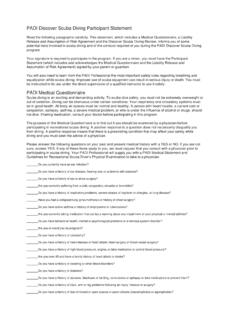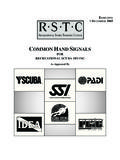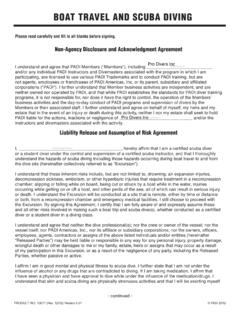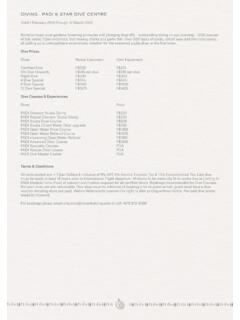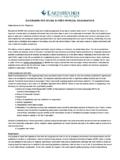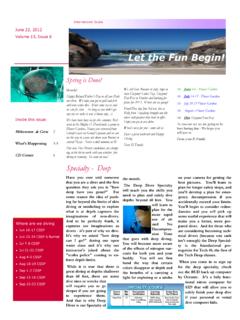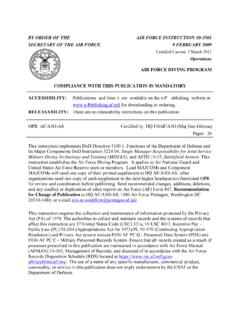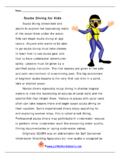Transcription of SCUBA in Older EA Aged Divers f - Best Pub
1 WCHM - 27 WOUND CARE 2010-13 Best Publishing Company. All Rights Reserved. Reproduction in whole or in part As the population gets Older , coupled with increased awareness of good health practices and the recognition that fitness contributes to participation in activities generally appropriate for younger individuals, decisions need to be made about what are appropriate activities for the Older aged SCUBA (self-contained underwater breathing apparatus) diver.
2 It is essential to appreciate the distinction between chronological and physiological age. Three factors, namely fitness, co-morbidities, and mobility and strength are fundamental when making decisions about participation in activities in general and in SCUBA diving in Older adults. There is almost always a time to call it quits for everything, including SCUBA diving . This article discusses the factors critical for making decisions as to whether or not the Older aged diver should continue SCUBA diving is noteworthy that when Social Security was enacted in 1935, the average age at death was 65.
3 During that time only one in 23 workers who paid into Social Security lived long enough to collect benefits. Today, one in three workers collects Social Security benefits. Besides better attention to good health practices and more attention than ever to fitness, one-third to one-half of the medical or surgical treatments now available did not exist in message is our society is getting Older ; we re living longer and want to continue to do things formerly consider inappropriate in former diving is no exception.
4 Physiological versus Chronological Age To define old requires amplification. It requires differentiation between chronological and physiological age which are not always the same (Figure 1). Chronological age is a person s actual age and does not consider cognitive function, comorbidities, experience, physical fitness, judgment, mobility and strength. In contrast, physiological age is highly subjective, often evoking comments that a person appears younger (or Older ) than his/her stated age would suggest.
5 We consider physical fitness, health status, and cognitive function as the three main considerations for defining apparent age. Measures to judge physiological age such as ability to do activities of daily living, capacity for doing exercise/sport pursuits, participation in social activities, and work status SCUBA in Older Aged DiversBy Michael B. Strauss, MD;Jeremy A. Busch, DPM; and Stuart S. Miller, MDfEAtUREDAre not always in balanceFigure 1 DeFInIng OlD Legend: Chronological age is easy to establish using the birth date.
6 Physiological age is more akin to the functional (physical and mental) activities that the average person would be doing at a different age. If infirm, for example, the physiological age may be Older than the chronological age; if more active, the physiological age may be younger than the chronological 2010-13 Best Publishing Company. All Rights Reserved. Reproduction in whole or in part - WCHMare easy to ascertain. Other less objective considerations include cognitive function, creativity, capacity to recover from illness or injuries, tolerance to sleep deprivation, and quickness to regain physical fitness ( getting into shape ) after periods of inactivity.
7 We designed a quick and easy-to-use tool to quantify a person s health status (Table 1). The tool consists of summating five assessments each graded from 2 (best) to 0 (worst) to generate a 0 to 10 score. The assessments include: 1) ability to do activities of daily living, 2) ambulation, 3) comorbidities, 4) smoking/steroid history (whichever gives the lower score) and 5) neurological deficits. Scores of 8 to 10 points quantify the person as healthy, 4 to 7 points as impaired, and 0 to 3 points as decompensated.
8 Information quickly obtained from this tool helps assess the general health of a SCUBA diver and provides guidelines as to who should and should not dive. As we get Older there are changes in the function of our body organs and organ systems (Table 2 and Elements A-E).2 The appreciation of changes that occur with aging in different body systems help in decision making for participation, modifying or discontinuation of an activity. For example, contrast the time an athlete can actively play football versus golfing or swimming.
9 Changes occur in our bodies when getting Older and almost all hinder performance. The one change that may improve with aging (and experience) is judgment. Improved judgment can help compensate for deterioration in the other items that occur in the body which impose limitations for SCUBA diving . For example, the Older diver may limit his/her diving to easily accessible sites that have optimal diving conditions. Consequently, improved judgment as a favorable change has to be balanced with changes which can deteriorate function when making decisions about SCUBA diving as one gets Older (Figure 2).
10 While the internet is replete with information defining aging, Older age, seniors, elderly, Older adults, geriatrics, silver years, mandatory retirement, etc., the distinction is not clear cut between old and not old when considering humans. Some gerontologists make a distinction between young-old (55-74) and old-old (75 and Older ).1 The question of old is clouded by societal norms. One example of this is becoming eligible for full benefits for Social Security in the USA at 66 years of age, but even this criteria is expected to increase with increasing productivity and longevity of our population over this arbitrary way to look at aging is through physical and cognitive changes such as graying of hair, loss of near vision, decreased libido, impaired hearing, slower and/or less cognition skills.
